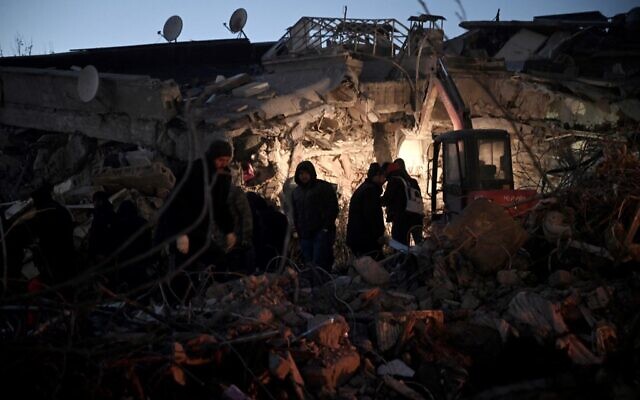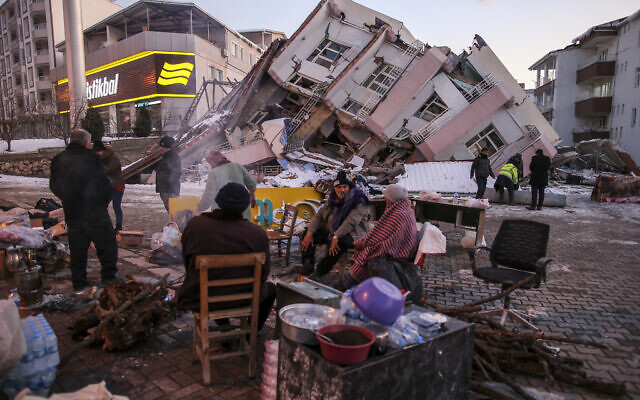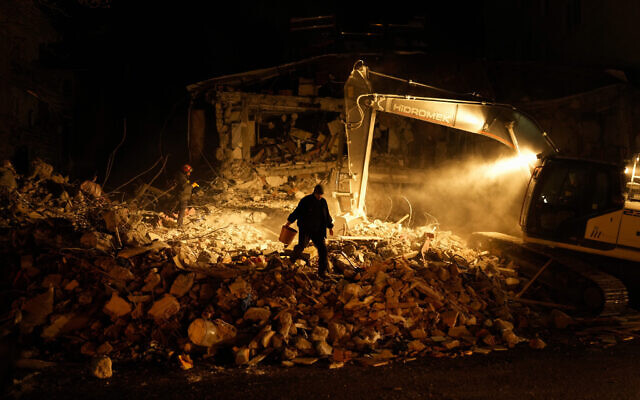The death toll from Monday’s devastating earthquake that struck Turkey and Syria has topped 15,000 as of Wednesday, according to officials, as rescuers raced to rescue survivors trapped under the rubble in freezing weather.
Monday’s 7.8-magnitude earthquake killed 12,391 people in Turkey and 2,992 in Syria, officials and doctors said, bringing the total death toll to 15,383. Thousands more were injured.
Rescuers in Turkey and Syria are searching for signs of life from the countless people trapped under the rubble. teams from more than two dozen countries, including israelThousands of local emergency workers have joined the effort. But the scale of the devastation caused by the earthquake and its powerful aftershocks was so vast and spread over such a large area that many people were still waiting for help.
Experts said the window of escape for those trapped under the rubble or unable to meet basic needs is fast closing. At the same time, he said that it is too early to give up hope.
“The first 72 hours are considered critical,” said Steven Godby, a natural hazards expert at Nottingham Trent University in England. “The median survival ratio is 74% within 24 hours, 22% after 72 hours and 6% on the fifth day.”
Rescue workers sometimes used excavators or picked carefully through the rubble. It is not yet clear how many people may still be trapped.

Residents and rescue workers search for victims and survivors from the rubble of collapsed buildings in Kahramanmaras, two days after a magnitude 7.8 earthquake struck southeastern Turkey on February 8, 2023. (Ozan Kose/AFP)
Rescue stories continued to provide hope that some people still trapped might be found alive. A crying newborn still attached to its dead mother by an umbilical cord Rescued Syria on Monday. In Kahramanmaras, Turkey, rescuers pulled a three-year-old boy from the rubble, and teams dispatched by the Israeli army at least four people were savedIncluding a two-year-old boy.
But David Alexander, a professor of emergency planning and management at University College London, said data from past earthquakes showed the chances of survival were now slim, especially for seriously injured persons.
“Statistically, today is the day we stop finding people,” he said on Wednesday. “That doesn’t mean we should stop exploring.”
Alexander cautioned that the final death toll may not be known for weeks due to the sheer volume of debris.
The earthquake toll has already been surpassed by the 7.8 magnitude earthquake that hit Nepal in 2015, when 8,800 people were killed. The 2011 earthquake in Japan caused a tsunami that killed about 20,000 people.
Many of the survivors of this week’s earthquake lost their homes and were forced to sleep in cars, government shelters or outside amid rain and snowfall in some areas.
“We don’t have a tent, we don’t have a heating stove, we don’t have anything. Our children are in bad shape,” said 27-year-old Aisen Kurt. “We won’t die of hunger or the earthquake, we’ll freeze to death.”
Temperatures in the quake-hit Turkish city of Gaziantep plunged to minus five degrees Celsius early Thursday, but thousands of families spent the night in cars and makeshift tents – too scared or banned from returning to their homes.
Parents walked the streets of the city covering their children with blankets because it was warmer than sitting in a tent.
“When we sit, it’s painful, and I’m afraid that whoever is in it is trapped under the rubble,” said Melek Halisi, who wrapped her two-year-old daughter in a blanket as she helped rescuers Used to watch working till late night. ,

People stand near collapsed buildings in Golbasi in Adyaman province, southern Turkey, Wednesday, February 8, 2023. Rescue teams worked through the night in Turkey and Syria, pulling more bodies from the rubble of thousands of buildings hit by the earthquake. (AP/Imrah Gurel)
“Eventually we’ll have to go to the tent, but I don’t want to go,” she said. “I can’t stand the cold, but neither can I stand the thought of going back to my apartment.”
City officials have barred thousands of residents from moving back into apartment blocks that are considered at risk from the aftershocks every day in the area.
‘Our children are feeling cold’
Around Halcyon, smoke from dozens of fires filled the night air. Supermarkets and other businesses provided wooden pallets for families to burn.
Some people have found sanctuary with neighbors or relatives. Some have left the area. But many have nowhere to go.
Gyms, mosques, schools and some stores have opened in the night. But beds are still at a premium and thousands spend nights in cars with their engines running to provide heat.
“I don’t have a choice,” said Suleiman Yanik, as he slept in the back seat with his wife and another child, a child playing with the steering wheel of his car.
“The smell is terrible, but we can’t go home,” he said.
Burhan Kagdas, the restaurant’s manager, said he had been sleeping in the car since Monday’s earthquake because of “psychological” resistance to returning home to his family.
He was unsure how long they could hold out.

Rescuers search for people in destroyed buildings in Elbistan, southern Turkey, Wednesday, February 8, 2023. (AP/Francisco Seco)
Many families have complained about the government’s attitude towards the earthquake relief operation.
President Recep Tayyip Erdogan acknowledged during a visit to the region on Wednesday that “shortcomingsBut insisted that the scale of the disaster was too large for any government to handle.
Poor families camped around the 6th-century palace of Gaziantep, badly damaged by the earthquake, said the authorities had done nothing for them.
The families have made makeshift houses out of tarpaulin and wood thrown away by others. “They could have at least given us some tents,” Ahmet Huseyin said.
“Our children are feeling cold,” said the 40-year-old father of five. “We have had to burn park benches and even some of the children’s clothes. There was nothing else,” he said.
Some shelters did not even have facilities like a tarpaulin to cover the entrance.
Emel Osman, 14, whose family fled Syria for Turkey seven years ago, said the authorities should have put up a tent “at least for the children”.
The stones of the palace are in danger of falling on the park where the families have taken refuge. But they say they have no choice as they have no car and no alternative shelter.
